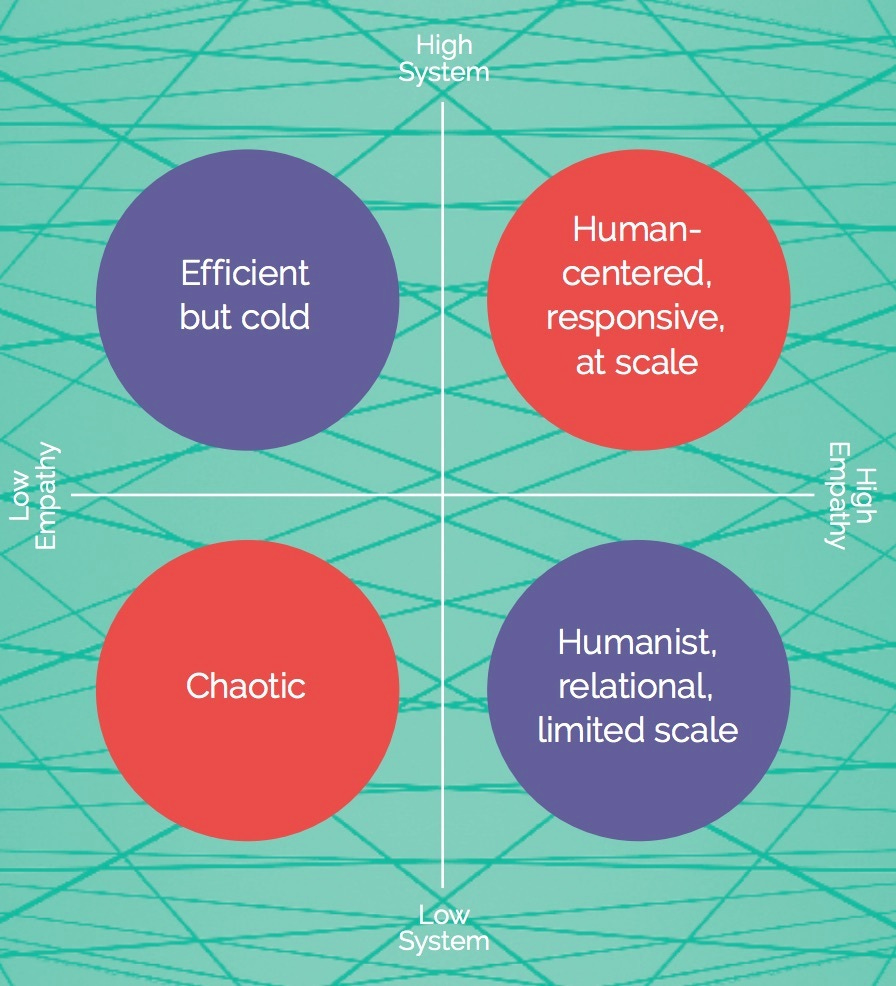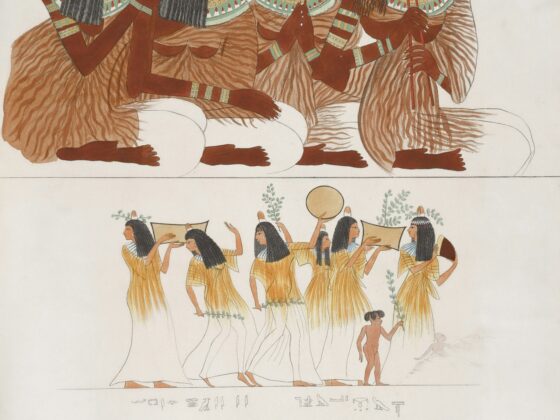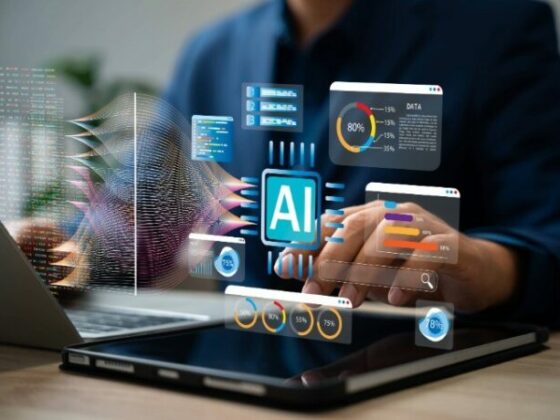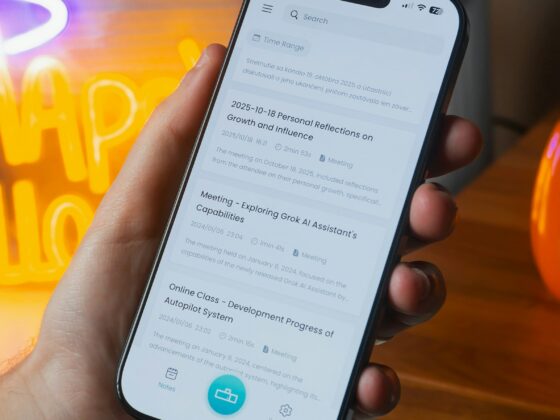A defining dynamic for our new world, why AI may be slower to replace jobs than we think, agentic commerce, Australian workslop, and writing advice from C.S. Lewis
Way back in 2017 (crikey) I wrote a report for the IPA on the Future of Agencies. One of the key frameworks that I used described how agencies could succeed in the future by focusing on combining systems (which I defined as data, technology, efficiency, delivery at scale) and empathy (human insight, creativity, relational connection). Given where we’re at with AI right now this feels like it was more prescient than I could have known at the time.
The inspiration for the analogy came from journalist and author Charles Leadbetter who, in 2016, had written a report on how cities can operate effectively (The London Recipe, Centre for London, PDF). Leadbetter describes how successful cities thrive when they combine efficient infrastructure (‘systems’) with social connection and civic imagination (‘empathy’). In his view, great cities don’t just function well, they feel alive. Their competitive advantage comes from the interplay between order and emotion, between structure and spontaneity.
In this sense systems are the networks and infrastructure that make large-scale living possible: transport, housing, energy, waste, digital platforms, planning, and governance. They bring reliability, transparency, and scale. Without strong systems, cities can become chaotic and fragile.
Empathy, on the other hand, is like the ‘dark matter’ of urban life. It’s what makes cities sociable, civil, and creative. It’s invisible but essential. It’s the ability of people to connect, cooperate, and coexist amid differences and diversity. Empathy shows up in both small acts of civility and collective generosity. It is what transforms efficient systems into humane experiences and what makes shared life work, not just run. Systems without empathy risk sterility, becoming impersonal, or overly technical, and even alienating.
Leadbeater uses London 2012 as the archetype of systems and empathy working in harmony. When London hosted the Olympic and Paralympic Games it succeeded because of excellent planning, logistics, and design. The transport worked efficiently to get huge numbers of people efficiently around the city and the venues worked pretty flawlessly. But what made it magical was the human connection that those two months embodied. The warmth, the shared experience, the 70,000 Games Maker volunteers, the sense of collective joy.
He sets out a couple of extremes that cities risk falling into. A high system, low empathy trap where the city becomes efficient but soulless, an over-planned ‘machine for living’. And a high empathy, low system city which is vibrant but chaotic, and where creativity thrives locally but struggles to scale or to sustain itself. The genius of London, and what he calls its ‘cosmopolitan self-governance at scale’, lies in finding a dynamic equilibrium between the machine and the organism. It’s a city both highly ordered and deeply human, where systems enable social life rather than replace it.
I’ve always loved this analogy and I think it has a heightened and wider resonance now in the era of AI. Leadbetter argues that we need to learn to design systems with empathy built in, or what he calls ‘socially intelligent systems’ that blur the edges between the mechanical and the personal, and between planned efficiency and lived experience.
So systems and empathy are not just how we should see successful cities but how we should shape how we live, work, and make sense of complexity in the era of AI. Systems are the organising logic of our time, increasingly invisible infrastructures that bring reliability and predictability and help billions of people to live their lives. But left unchecked they can flatten difference, standardise experience, and create distance between action and consequence. It is empathy that helps us to navigate complexity, understand context, apply moral and emotional intelligence, and reconnect us to consequence. It is empathy that humanises design, governance and decision-making. It is empathy that ensures that the pursuit of scale does not erase our sensitivity to place, culture, and individual need.
As far back as 1959, C.P. Snow’s ‘Two Cultures’ (PDF) described the divide between the scientific and literary cultures, between the world of systems, data, and engineering versus that of imagination, ethics, and emotion. Progress, he said, depends on bridging these two worlds. We hear so much these days about humans and machines working effectively together, and the need for so-called ‘human-in-the-loop’. For me, systems and empathy is what this ultimately means. With AI, our systems are no longer just mechanical, they are cognitive. We may be able to expand our capacity to process information through algorithms and automation, but we risk losing the connection between human intent, nuance, ethics and emotion and output. Equally, good intentions without systemic literacy means that we cannot turn understanding into impact.
The success of London 2012 was founded on a system that worked seamlessly, but also which radiated warmth, shared meaning and collective spirit. For cities, industries, organisations, and teams the job now is to learn how systems can enable empathy, and how empathy can inform systems.
Given how rapidly this is all advancing, I don’t think its too out there to say that the modern world depends on our ability to hold both together.
Rewind and catch up:
The Future of Strategists and Planners
How to be Interested (Part One)
The Future of Strategy in the Age of AI
Image: Philip Pryke, CC BY 2.0, via Wikimedia Commons
If you do one thing this week…
Some interesting perspective this week on whether AI will actually take jobs. An update from the Budget Lab at Yale points out that we are yet to see significant disruption from AI in the job market and that current changes are incremental and follow pre-existing patterns of churn (HT Azeem Azhar). And James Marriott linked to a fascinating analysis of why AI is yet to replace Radiologists, who were meant to be prime candidates for disruption: ‘radiology is a field optimized for human replacement, where digital inputs, pattern recognition tasks, and clear benchmarks predominate’.
The reasons why AI hasn’t yet replaced Radiologists include the fact that outside of strictly controlled conditions AI can perform very differently. So we still need human adaptability and nuanced understanding. It reminded me of that thought (from Tom Goodwin I think) about how unlikely it is that self-driving trucks will replace truck drivers in the short term, primarily because there is far more to truck driving than driving trucks (including loading, unloading, vehicle inspection, maintenance, customer communication and handling unpredictable situations). We tend to look at jobs from the outside and over-simplify them, thinking they are a lot more straightforward than they actually are.
Photo by CDC on Unsplash
Links of the week
-
ChatGPT release Apps, a framework that lets third-party apps run natively inside ChatGPT conversations, so the model can call and interact with them during chat. And also AgentKit, a toolkit and unified platform that makes it easier to build and deploy AI agents that carry out multi-step tasks
-
Meanwhile conversational commerce finally seems at risk of becoming a reality. OpenAI have already launched ‘Instant Checkout’ and Agentic Commerce Protocol, which effectively enables purchases directly within AI conversation without leaving ChatGPT. And they’ve now partnered with Walmart. Quite whether people trust AI agents with their payment details is another question.
-
And OpenAI is making plans (FT) to make good on the staggering $1tn in spending over the next five years it has said it will take to lead the world in AI.
-
Investors are betting big that AI will lead to a significant increase in leisure time, but this was an interesting take from Sarah O’Connor in the FT about why things may not play out in that way (TL;DR thread from Sarah here)
-
A massive (and useful) data dump here (700 slides!) in the annual We Are Social/Meltwater state of global digital overview. Full of useful stats including that there are over 1 billion people now using AI each month.
-
File under ‘I’m sure we’ll see a lot more of this’: Deloitte Australia has to pay back a bunch of fees to the Australian government after a report it produced for them turned out to be full of AI hallucinations (HT Ben Evans)
-
A couple of new books coming out from friends of ODF which are worth checking out. Richard Shotton has a new co-authored book out called Hacking the Human Mind (‘The behavioral science secrets behind 17 of the world’s best brands’). And Sam Conniff and Katherine Templar Lewis have a new book coming out on Jan 1st 2026 called ‘The Uncertainty Toolkit’ which you can pre-order from Waterstones (and get a 25% discount if you enter ‘October25’ at check out).
And finally…
Lots of wisdom in C.S. Lewis’s advice to a young schoolgirl on how to become a better writer. I liked the point about not discarding previous work that you’re not happy with. I quite often go back to previous drafts of posts because I have a new angle or thought which brings it to life again. (HT The Culturist)
Weeknotes
This week has been a busy old one. I flew in from overseas straight into delivering three webinars for the good folk at Econsultancy, and then yesterday was the IPA AI in Advertising course which I love doing. Next week I’ll be speaking and moderating a panel on the topic of the impact of AI on agencies at the Google Partner Summit in Dublin which should be fascinating.
Thanks for subscribing to and reading Only Dead Fish. It means a lot. This newsletter is 100% free to read so if you liked this episode please do like, share and pass it on.
If you’d like more from me my blog is over here and my personal site is here, and do get in touch if you’d like me to give a talk to your team or talk about working together.
My favourite quote captures what I try to do every day, and it’s from renowned Creative Director Paul Arden: ‘Do not covet your ideas. Give away all you know, and more will come back to you’.
And remember – only dead fish go with the flow.







